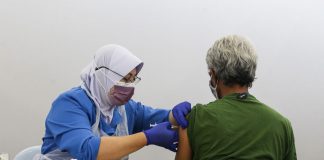PETALING JAYA,Mar 25: The co-chairman of the Malaysian Bar Council’s criminal law practice committee, Muhammad Rafique Rashid Ali, says laws passed under the emergency ordinance allow non-health ministry officers to issue compounds.
Therefore, he said, the contention by Beruas MP Ngeh Koo Ham that only the health director-general or his authorised officers were allowed to issue compounds and that compounds issued by the police or officers from other ministries were void, was not correct.
Rafique told FMT that attention must be paid to the updated definition of “authorised officer” in the Emergency (Prevention and Control of Infectious Diseases) (Amendment) 2021, which had broadened the term’s scope beyond officers, health inspectors and other direct appointees.
“The new definition of an ‘authorised officer’ is amended: the words ‘any medical officer of health, any health inspector’ have been deleted and substituted with ‘any environmental health officer or any suitable persons’.
“Hence, the definition of an authorised officer is now not limited to the health ministry (MoH) officers. A police officer is surely an authorised officer. With this new ordinance, any non-MoH officer has the power to issue a compound, provided that he is an authorised person. The mere fact that the compound was issued by a non-MoH officer does not automatically make it void.”
Rafique said Ngeh’s other issue, over whether every compound had received written consent from the public prosecutor, which Ngeh understood was not the case, was valid.
“If no written consent by the public prosecutor was obtained before the issuance of the said compound, then it is void despite being issued by an authorised officer. The compound must clearly state that it is with the consent of the public prosecutor.”
He said those who had been issued a compound which they believed to be void because of this should appeal to their district health office.
“If it is void due to no written consent from the public prosecutor, then the people ought not to pay it. The people ought to explain to such authorised people and the district health office that it is void in law and they are not going to pay.
“Should the matter go to the courts, then the people must challenge it in court. Why would you pay for a voidable or defective compound?”



















